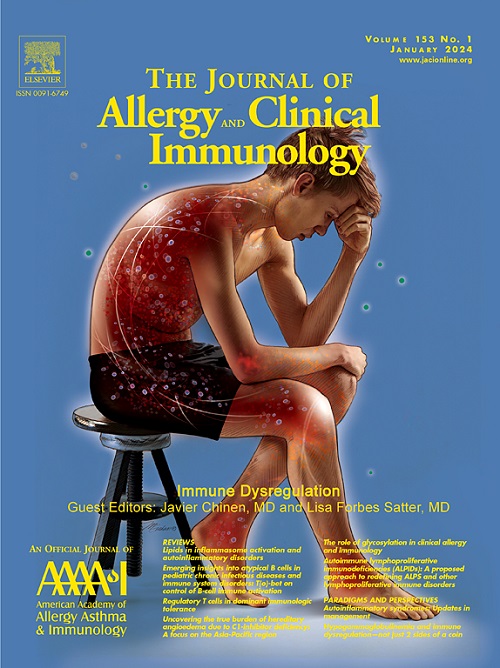生活方式相关的代谢物特征与迟发性哮喘的风险
IF 11.2
1区 医学
Q1 ALLERGY
引用次数: 0
摘要
健康的生活方式行为导致全身代谢紊乱,与迟发性哮喘的风险显著相关。然而,潜在的代谢相关机制尚不清楚。目的本研究旨在确定生活方式相关代谢物,并评估其对哮喘事件的预测价值。方法利用英国生物银行人群(40-69岁)的核磁共振代谢组学数据,通过多元线性回归确定与健康生活方式评分相关的血浆代谢物。Cox比例风险回归用于进一步筛选与迟发性哮喘风险相关的代谢物。弹性网正则化选择关键代谢物建立哮喘风险预测模型,结合常规临床特征和生活方式因素。基于非零正则化系数得出代谢评分,并通过生存分析评估其与哮喘风险的相关性。模型和代谢评分表现在未使用的英国生物银行内部参与者和中国嘉道里生物银行外部队列中得到验证。结果在198607名参与者(平均年龄56.4岁)中,159项血浆代谢物与健康生活方式评分显著相关,其中103项与哮喘发生风险相关。选择9种代谢物纳入哮喘风险预测模型,显著提高了模型的预测性能(曲线下面积:0.812比0.758)。与代谢特征良好的个体相比,代谢特征不良的个体患哮喘的风险增加77.0%(风险比[HR] 1.770, 95%可信区间[CI] 1.634-1.918),其中女性的影响更大(风险比1.914,95%可信区间[CI] 1.729-2.118)。预测模型和代谢评分的结果在内部和外部验证中都得到了证实。结论多种生活方式相关代谢物与迟发性哮喘风险相关,有助于对哮喘风险进行分层,尤其是女性。本文章由计算机程序翻译,如有差异,请以英文原文为准。
Lifestyle-associated metabolite signatures and the risk of late-onset asthma.
BACKGROUND
Unhealthy lifestyle behaviors, leading to systemic metabolic disturbances, are significantly linked to the risk of late-onset asthma. However, the underlying metabolism-related mechanisms remain unclear.
OBJECTIVE
This study aims to identify lifestyle-related metabolites and assess their predictive value for incident asthma.
METHODS
Using NMR metabolomics data from the UK Biobank population (aged 40-69), plasma metabolites associated with healthy lifestyle scores were identified through multiple linear regression. Cox proportional hazards regression was used to further screen metabolites linked to late-onset asthma risk. Elastic net regularization selected critical metabolites for developing an asthma risk prediction model, incorporating conventional clinical characteristics and lifestyle factors. A metabolic score based on non-zero regularization coefficients was derived, and its association with asthma risk was evaluated through survival analysis. Models and metabolic score performance were validated in unused internal UK Biobank participants and an external China Kadoorie Biobank cohort.
RESULTS
Among 198,607 participants (mean age 56.4 years), 159 plasma metabolites were significantly related to healthy lifestyle scores, 103 of which were associated with incident asthma risk. Nine metabolites were selected and incorporated into the asthma risk prediction model, significantly improving its predictive performance (Area under the curve: 0.812 vs. 0.758). Individuals with an unfavorable metabolic signature exhibited a 77.0% increased risk (hazard ratio [HR] 1.770, 95% confidence interval [CI] 1.634-1.918) of developing asthma compared to those with a favorable metabolic signature, with a stronger effect observed in females (HR 1.914, 95% CI 1.729-2.118). The results for the predictive model and metabolic score were confirmed in both internal and external validations.
CONCLUSION
Multiple lifestyle-related metabolites are associated with late-onset asthma risk and can help stratify asthma risk, particularly among females.
求助全文
通过发布文献求助,成功后即可免费获取论文全文。
去求助
来源期刊
CiteScore
25.90
自引率
7.70%
发文量
1302
审稿时长
38 days
期刊介绍:
The Journal of Allergy and Clinical Immunology is a prestigious publication that features groundbreaking research in the fields of Allergy, Asthma, and Immunology. This influential journal publishes high-impact research papers that explore various topics, including asthma, food allergy, allergic rhinitis, atopic dermatitis, primary immune deficiencies, occupational and environmental allergy, and other allergic and immunologic diseases. The articles not only report on clinical trials and mechanistic studies but also provide insights into novel therapies, underlying mechanisms, and important discoveries that contribute to our understanding of these diseases. By sharing this valuable information, the journal aims to enhance the diagnosis and management of patients in the future.

 求助内容:
求助内容: 应助结果提醒方式:
应助结果提醒方式:


